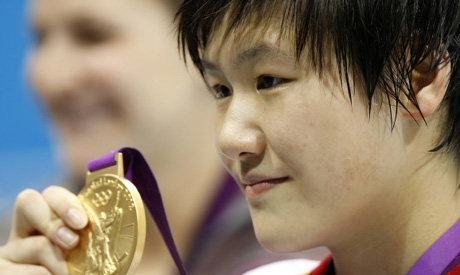
China's Ye Shiwen holds her gold medal up after winning the women's 200-meter individual medley swimming final at the Aquatics Centre in the Olympic Park during the 2012 Summer Olympics in London, Tuesday, July 31, 2012. (Photo: AP)
Chinese officials have reacted angrily to doping accusations swirling around their newest swimming superstar Ye Shiwen, who has won two gold medals at the London Olympics.
The accusations grew after the 16-year-old Ye won the women's 400-meter individual medley, and Ye also won Tuesday's 200-meter IM race. In Saturday's 400, Ye swam the last lap in 28.93 seconds - a split-second faster than American winner Ryan Lochte posted in the last 50 of the men's race.
On Wednesday, the state-run Global Times fired back, saying questions about Ye's feats were unfair.
"The West still judges China with an old mentality, and is petty about the progress China makes," the newspaper said in an editorial. That was followed by the state broadcaster CCTV stepping in to support Ye on its noon newscast.
Ye's father, Ye Qingsong, told Chinese media that western media are "always arrogant." Olympic organizers in London also defended the Chinese swimmer.
Ye received support on Wednesday from the swimmer who finished second to her in Tuesday's race, Alicia Coutts of Australia.
"I feel for the poor girl, just to have that speculation weighing on her," Coutts said. "I believe in innocent until proven guilty."
For decades, Beijing has rallied public support with Olympic gold medals won by athletes trained in a Soviet-style sports system supported by the government.
The athletic achievements are used to inspire national pride and patriotism, and deflect criticism of the ruling Communist Party.
In the Chinese media, the Olympic medal table is ranked by the number of golds won, instead of the total number of medals. After winning 51 golds - the most every by a country - at home four years ago, China has won 13 already in London, followed by the United States with nine. Both have 23 medals overall.
To many Chinese, the golds are a sign of the country's power, and gold medalists are rewarded far more generously than silver and bronze medal winners.
Sometimes that means tears of sorrow even when winning a silver, as was the case with weightlifter Wu Jingbiao this week.
"I let my country down; I let the Chinese weightlifting team down; I let everyone who has cared about me down. I am sorry," Wu said through tears after finishing second behind the surprise North Korean winner the 56-kilogram division.
In another case, medal hopeful in the women's 53-kilogram category, Zhou Jun, was attacked in the media after she was eliminated without a single successful lift. A Chinese newspaper called it the "most shameful defeat" in the history of Chinese women's weightlifting.
The doping questions come as China is involved in another controversy in London, with badminton officials launching disciplinary proceedings against four women's doubles pairs Wednesday for appearing to try and lose their matches at the London Olympics to secure a favorable draw.
World doubles champions Wang Xiaoli and Yu Yang of China lost to their South Korean opponents Jung Kyun-eun and Kim Ha-na in a result ensured that the top-seeded Wang and Yu will avoid playing their No. 2-seeded Chinese teammates until the final. Both pairs were booed loudly by the crowd Tuesday after dumping serves into the net and making simple errors.
(For more sports news and updates, follow Ahram Online Sports on Twitter at @AO Sports and on Facebook at AhramOnlineSports)
Short link: